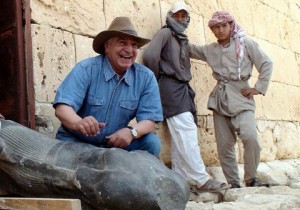By Bob Hicks
It appears that Zahi Hawass, Egypt’s legendary minister of antiquities, has become a part of the history he has spent a lifetime trying fiercely, and often controversially, to protect. Judith H. Dobrzyinski, on her blog Real Clear Arts, reports that Hawass has resigned under pressure amid rumors of looting and charges that he himself had been stealing from the Egyptian Museum in Cairo.
 Read Dobrzynski’s several posts from March 3 and her followup from March 4: It’s a messy situation. And it helps answer a question we raised almost a month ago, in this post from Feb. 8: “What will (Hawass’s) role in any new government be? Can he protect the past and be part of the future, too?”
Read Dobrzynski’s several posts from March 3 and her followup from March 4: It’s a messy situation. And it helps answer a question we raised almost a month ago, in this post from Feb. 8: “What will (Hawass’s) role in any new government be? Can he protect the past and be part of the future, too?”
Art Scatter hasn’t had a lot to say about the revolutions sweeping northern Africa because, frankly, other people know a lot more about the situation than we do. Is this Ten Days that Shook the World, to be followed by Stalin? Is it the Velvet Revolution in Czechoslovakia, which led to an internal divorce but also to lasting openness and freedom? Is it something very much its own, and will it play out differently in Egypt, say, than Libya? Revolutions have both intended and unintended consequences. They can be instruments of revenge — a person who invites grudges can easily become a target, whether it’s justified or not — and they are invitations to mischief. In a vacuum, or a chaotic shifting of power, corruption can be epidemic.
We simply don’t know what’s going to happen. We hope fervently that this will mark a new openness, fresh opportunities, more individual rights, especially for women in the region. We’re aware that it could lead instead to more extreme religious zealotry and a further clamping down on what we in the West think of as basic individual rights. We suspect that no matter what happens, dealing with the fallout is going to be bumpy for the West, which will want to influence events but will have to do so delicately, recognizing that it’s the African peoples’ land and the African peoples’ cultures, not ours.
For the broad worlds of history and culture, a vital issue remains as we framed it here a month ago: “Hawass suddenly has a massive task on his hands: how to protect and preserve his nation’s priceless cultural heritage in the face of a possible revolution.” That hasn’t changed, except the revolution is real and Hawass, barring yet another turnabout, won’t be making any of its crucial decisions. Still, this is everyone’s history. Whatever emerges, culturally as well as politically, the whole world has a stake in it. And most of us in most of the world can only watch and hope.
*
Photo: Happier times for Zahi Hawass, displaying a Ptolemaic statue discovered at Taposiris Magna, in northern Egypt, on May 8, 2010. Voice of America/Wikimedia Commons.